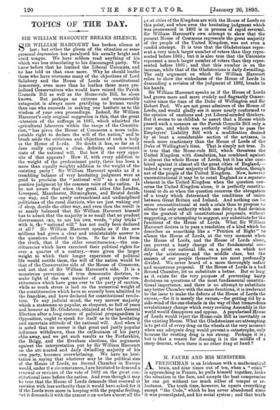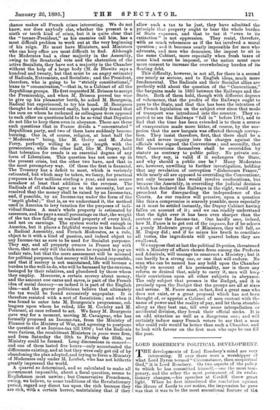M. FAURE AND HIS MINISTERS.
AFRENCHMAN is an Irishman with a mathematical brain, and nine times out of ten, when a " crisis" is approaching in France, he pulls himself together, looks the situation in the face, and accepts the best compromise he can get without too much either of temper or re- luctance. The tenth time, however, he upsets everything except "the Code," which he has never abandoned since it was promulgated, and his social system ; and that tenth chance makes all French crises interesting. We do not know, nor does anybody else, whether the present is a ninth or tenth kind of crisis, but it is quite clear that the " tanner-President," as his enemies call him, has a most difficult problem to work out at the very beginning of his reign. He must have Ministers, and Ministers who can keep office are most difficult to find. Although the Moderates had a clear majority in the Assembly, owing to the Senatorial vote and the abstention of the active Socialists, they have not a majority in the Chamber without the help of a large body (M. de Blowitz says a hundred and twenty, but that must be an angry estimate) of Radicals, Extremists, and Socialists ; and the President, therefore, who is going to be "strictly constitutional," leans to " concentration,"—that is, to a Cabinet of all the Republican groups. He first requested M. Brisson to accept the Premiership, and when M. Brisson proved too wise to give up his pleasanter berth, he asked M. Bourgeois, Radical but experienced, to try his hand. M. Bourgeois thought he should succeed easily, but speedily found that the men on whom he reckoned as colleagues were opposed to each other on questions held to be so vital that Deputies do not like to keep them even in abeyance. There are three such questions that in France divide a " concentrated " Republican party, and two of them have suddenly become burning. One is, of course, religion, at least half the " Moderates " being, like M. Gi6vy and M. Jules Ferry, perfectly willing to go any length with the persecutors ; while the other half, like M. Dupuy, hold that toleration for creeds is an essential dogma of any form of Liberalism. This question has not come up in the present crisis, but the other two have, and that in the most peremptory way. Of these the first is financial. The Treasury has a deficit to meet, which is variously estimated, but which may be taken, we fancy, for practical purposes at four millions sterling a year, and must secure somehow at least that addition to the revenue. The Radicals of all shades agree as to the necessity, but are resolved that the money shall be raised by an Income-tax, and, if possible, by an Income-tax under the form of the " impot global ; " that is, as we understand it, the method used in America to levy taxation for the purposes of indi- vidual States. A man's whole property is estimated by assessors, and he pays a small percentage on that, the weight of the tax thus falling on realised property of every kind, and not on earnings. The system works well enough in America, but it places a frightful weapon in the hands of a Radical Assembly, and French Moderates, as a rule, object to it with a kind of passion, and indeed object to any Income-tax as sure to be used for Socialist purposes. They say, and all property owners in France say with them, that not only will the rich soon be required to pay an unfair rate, but that the mere assessment will be misused for political purposes, that secrecy will be found impossible, and that if secrecy is not maintained, life will become a burden to the well-to-do, who will be harassed by the envious, besieged by their relatives, and plundered by those whom they employ. Moreover, a certain secrecy about money, and the amount one earns and saves, is part of the French idea of social decency—as indeed it is part of the English idea—and the graver politicians believe that ultimately the tax would be found excessively unpopular. It is therefore resisted with a sort of fanaticism ; and when it was found to enter into M. Bourgeois's programme, col- leagues upon whom he relied, like M. Coch6ry and M. Poincaii, at once refused to act. We fancy M. Bourgeois gave way for a moment, moving M. Cavaignac, who has formally proposed an Income-tax, from the Ministry of Finance to the Ministry of War, and agreeing to postpone the question of an Income-tax till 1896 ; but the Radicals were furious, the recalcitrant Ministers in posse were firm, and from Saturday the 20th to Friday the 25th, no Ministry could be formed. Long discussions in camer and one of them lasted five hours—only accentuated the differences existing, and at last they were only got rid of by abandoning the plan adopted, and trying to form a Ministry of Moderates only under M. Loubet, who has not hitherto greatly impressed the world.
A quarrel so determined, and so calculated to make all government impossible, about a fiscal question, seems to Englishmen most unwise ; but Conservative Frenchmen, owing, we believe, to some traditions of the Revolutionary period, regard any direct tax upon the rich because they are rich, with a certain horror, maintaining that if they allow such a tax to be just, they have admitted the principle that property ought to bear the whole burden of State expenses, and that to tax it "even to its extinction " is not oppression. They resist, therefore, with as much vehemence as if the tax involved a moral question ; mid it becomes nearly impossible for men who advocate, and men who denounce, the impost to sit in the same Cabinet, more especially when fresh taxes of some kind must be imposed, or the nation must once more consent to increase the overwhelming burden of its floating debt.
This difficulty, however, is not all, for there is a second one nearly as serious, and to English ideas, much more fundamental. The Radicals and their Socialist allies are perfectly wild about the question of the " Conventions," the bargains made in 1883 between the Railways and the State. Both of them hold, though with different degrees of vehemence, that the profits of the Railways ought to pass to the State, and that this has been the intention of all French legislation on the subject ever since that mode of transport was introduced into the country. They ex- pected to see the Railways "fall in" before 1915, and to find that the time has been extended is to them a source of exasperation made more bitter, of course, by the sus- picion that the new bargain was effected through corrup- tion. They insist therefore, first, that there shall be &- full and severe inquiry into the charges against the officials who signed the Conventions ; and secondly, that the Conventions themselves shall be overridden by statute as contrary to public policy. No private con- tract, they say, is valid if it endangers the State, and why should a public one be ? Many Moderate& are, however, unwilling to further investigation, holding- that any revelation of corruption " dishonours France," while nearly all are opposed to overriding the Conventions, not only because that would involve confiscations, but because the Assembly, in overriding the judicial decision which has declared the Railways in the right, would set a precedent for disregarding the independence of the Courts. As our readers will perceive, upon a question like this a compromise is scarcely possible, more especially as it must be settled instantly, the Dupuy Cabinet having fallen on account of it ; and we can readily understand that the fight over it has been even sharper than the contest over the Income-tax. One hardly sees, indeed, how M. Faure is to get out of the impasse, for if he select s a purely Moderate group of Ministers, they will fall, as M. Dupuy did ; and if he mixes his broth to conciliate all tastes, the ingredients will quarrel before they are swallowed.
We suppose that at last the political Deputies, threatened with a Ministry of affairs chosen from among the Prefects and Admirals, will manage to construct a Ministry ; but it can hardly be a strong one, or one that will endure. No man who can be named has any hold upon the Chamber solely on account of his personality, nor is there any reform so desired that, solely to carry it, men will keep their convictions upon all other subjects in abeyance. The only subject that presses is the Budget, and it is precisely upon the Budget that the groups are all at sixes and sevens. M. Faure must, in fact, find a great man who does not exist, or a great proposal which has not been thought of, or appoint a Cabinet of men content with the name of power and the reality of pay, and let them stumble along as they best can, till over some interpellation or accidental division, they break their official necks. It is an odd situation as well as a. dangerous one ; and will certainly induce many French voters to say that a man who could rule would be better than such a Chamber, and to look with favour on the first man who says he can fill the post.



















































 Previous page
Previous page